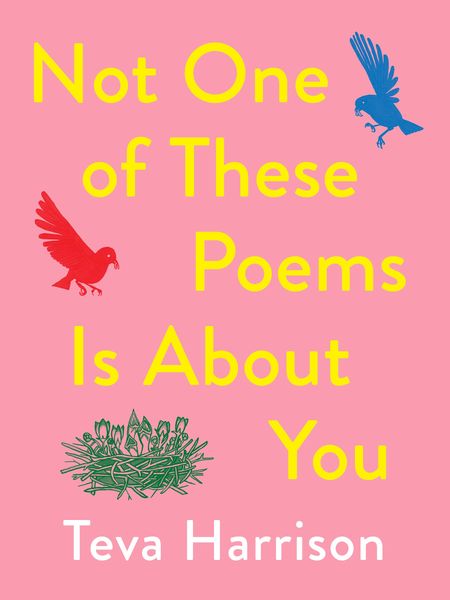Book Therapy: Teva Harrison’s Not One of These Poems Is About You
By Stacey May Fowles
“I am careless in my grief
Slip on gravel, send it tumbling down the cliff face.
I am careful in my grief.
Keep the precious rocks safe
As I climb.”
—Teva Harrison, A Pocket Full of Stones
There are a pair of shoes on a shelf in my closet.
They’re simple white flip flops, two or three sizes too small for me, with drawings of black and white flowers and vibrant blue birds on them. They’ve sat there on a shelf, mostly untouched, since Teva leant them to me late one evening in May, 2017.
Teva had asked me to be her date to a magazine awards presentation, one where she had been nominated for her groundbreaking writing and illustration work. I picked her up in a cab going downtown, and when she stepped in she looked vibrant in blue sequins and lavender eyeshadow, her hair still long and tied up and off of her face. I remember that it was a particularly difficult time in her treatment cycle, and in retrospect she was likely in a great deal of pain and discomfort, but she was upbeat. She was vibrant, and happy, and proud, and beautiful.
That evening is full of my favourite memories of her, the way she moved around that huge, busy room gracefully and deliberately, in a sort of self-possessed, effortless way. When someone very important asked “well, what do you do?” without missing a beat, and with her signature forthrightness, she replied, “I have cancer.”
We laughed a great deal that night, as if we were in on some secret joke no one else knew the punchline to. It seemed like she knew exactly who she was, and how she wanted to live, and that she did it fiercely, joyfully, and without doubt.
“I’m biting my tongue because this is what I do when you tell me how
Nobody would guess that I’m dying.
As if the guessing is what matters, not the dying.”
Your CanLit News
Subscribe to Open Book’s newsletter to get local book events, literary content, writing tips, and more in your inbox
***
Teva loved to dress up, and dance close, and cuddle in the back of taxi cabs. She imparted wisdom about eyebrow maintenance (“they’re sisters not twins”) and taught me how to properly roast radishes (“with fresh lemon juice and coarse salt.”) When my daughter was born, she delivered fresh fruit wrapped in prayer flags, and fed me homemade ginger cookies accompanied by Italian red wine. She was also notorious for giving the very best hugs—they lingered longer than you expected, and lasted just as long as you needed.
The summer before she died the two of us would go for walks around our neighbourhood, or spend time together in her robust garden, and she’d tell me about her writing—work she was embarking on, work she was excited about, work she was giving us, even when it hurt, and even when it was hard.
I was, at times, more vulnerable with her than I was with almost anyone I had ever met—not because she demanded it, but because she effortlessly facilitated it. It could be jarring—how she had this way of pulling you wide open without you even realizing it, allowing you to feel what was necessary to feel, and keeping you safe while you did so. Even when she was very sick, and very tired, and when things were very hard, she told you that what you were feeling mattered.
Teva was wholly disarming, and ridiculously funny, and at times even a tad bossy. She lit up a room and also commanded it. She was, by all means, a force—but certainly a paradoxically gentle one. She had a rare kind of power, proven by the number of lives she touched, the number of lives she changed.
When Teva died of metastatic cancer in April of last year, it was impossible to overestimate the magnitude of her impact, and how far-reaching her message of hope and kindness really was. While it was obvious that, through her award-winning work, she had made a massive contribution to our public conversations about cancer, she had also inspired so many to live fuller, happier, more more compassionate lives—no small feat in a world that feels increasingly isolating, alienating, and hopeless.
Through both her art and her presence, Teva had this uncanny ability to make us strive to be bigger than our self-prescribed constraints. She inspired us to be better, even when that kind of growth and change seemed impossible.
On the way home from the awards presentation that night in May, in the back of the cab, I burst into tears. I was in my fourth year of dealing with infertility, and it was wearing on me in ways I found very difficult to talk about. Something about being with her that night facilitated a sudden outpouring of messy emotion, and she invited back to her house, and sat me down on her living room floor. While surrounded by all her meticulously collected belongings, her art, her various shiny things, she put her arm around me, and took care of me.
It felt so selfish to cry on her shoulder given what she herself was shouldering, but Teva made it easy for me to share my grief. I remember she said, smiling, “My cancer doesn’t erase what you are going through.” (I have since learned she shared this sentiment with the innumerable people she helped in innumerable ways.)
Before I left that night, she thoughtfully leant me a pair of her shoes to walk home in. As I carried my uncomfortable heels through the park on that warm, early spring night, ridiculously dressed in a party dress and those too-small white flip flops, I felt infinitely lighter because of the comfort she had given me.
I had meant to return the shoes eventually, but time passes and things always seem get away from you—the things you want to do, and the things you want to say. I can’t bring myself to do anything with them, so they just sit there on a shelf, a daily reminder of her kindness that night. A reminder that when she held me and let me cry in her arms, I was actually a few weeks pregnant and didn’t know it yet.
***
Not One of These Poems Is About You is a candid collection about the realities of living with and dying of cancer. Though Teva so often spoke about the importance of living a life of joy and hope, though she radiated genuine light, there is a real darkness here—even an ugliness—that reveals the physical, emotional, and spiritual ramifications of her disease.
“Then the cancer,
the fucking cancer
Everything I’ve pictured is unlikely.
Now, I expect to die first. By decades.
I’ll leave you alone with all this stuff.
The detritus of a life lived
In a global fervour of collection.”
Teva writes about the betrayals of her body, the fatigue, the loss of her voice, the drugs that kept her calm, and asleep, and alive. She writes about facing the too-soon truth that the world and the people she loves will go on without her, and about somehow managing to summon flickers of magic in that all-encompassing darkness.
This book is unrelentingly frank, and honest, and hard, and reading it could feel like an intrusion if her reassuring voice wasn’t so deeply present on all its pages. In fact, the book lacks any unnecessary opaqueness of language, or distancing crypticness—it’s all here, laid bare, daring us not to look away. That was Teva’s way in both art and in life; she brought you so close that you would look around and be surprised by her vulnerability, by your own vulnerability, and despite any discomfort, you would feel grateful for it.
“We’re humans with complex feelings.
Complex arrangements of love and need,
Hope and disappointment,
Fear and wonder.”
***
If I’m honest, I have never felt properly equipped to write about Teva—her art, her impact, her legacy, her contribution. There are certainly people who knew her and loved her better than I, people who could do a better job of articulating everything she has given them and the world. But Teva has been incredibly generous in gifting us this collection, in giving us her entire body of work, and I knew her great kindness, and felt like I owed her at least this.
With Not One of These Poems Is About You, Teva has been brutally honest—more so than ever before—about the reality of her disease and the immeasurable cruelty that came with it. She’s been direct about what it means to watch your body change and deteriorate in ways you can’t understand, and about how it feels to know those you love will lose you. Not only is it a deeply personal, viscerally intimate letter about dying, delivered after death, but it is also a work of thoughtful literature, and does all the things that literature was meant to do.
This book brings solace. It brings understanding and companionship. It brings the truth, however ugly and however hard. It brings us something beautiful to hold onto, now that she is gone.
“When they come for us, find us, we will be bones worried smooth
by a surfeit of love.”
The views expressed by Open Book columnists are those held by the authors and do not necessarily reflect the views of Open Book.
Stacey May Fowles is an award-winning journalist, novelist, and essayist whose bylines include The Globe and Mail, The National Post, BuzzFeed, Elle, Toronto Life, The Walrus, Vice, Hazlitt, Quill and Quire, and others. She is the author of the bestselling non-fiction collection Baseball Life Advice (McClelland and Stewart), and the co-editor of the recent anthology Whatever Gets You Through (Greystone).





